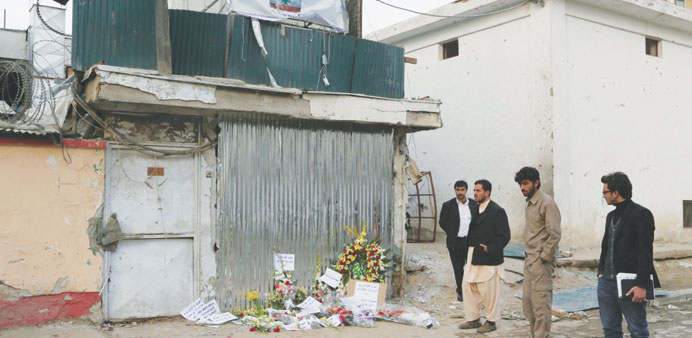It was a regular affair on a Friday evening for foreign and Afghan customers - enjoying dinner at the Taverna du Liban, one of the most popular restaurants in Kabul, in a relatively quiet, safe neighbourhood.
But last Friday it turned deadly.
Three Taliban suicide bombers attacked the Lebanese eating house, killing 21 people, including 13 foreigners - one of the worst attacks on foreign civilians in more than a decade of war.
The fatalities included the country chief for the International Monetary Fund, a top UN political officer, American professors, European Union staff, government advisers and aid workers.
The attack has shaken the expatriate community in the Afghan capital. And it has also highlighted the possibility that foreign civilians there may not be as safe they used to be.
Foreign aid workers normally enjoy Fridays - the Afghan weekend - having snacks and drinks with friends and colleagues.
But there is fear in the air.
“It is getting more dangerous here,” one British aid worker said.
“With attacks like Friday’s you do not feel safe enough to leave your house. And this is Kabul, with so much security.”
Political analyst Kate Clark put it like this: “In a war, in general, you distinguish between civilian and military targets.”
But Friday’s attack was unusual, she said, because “it was an attack on ... foreign civilians just because they were foreigners.
“The Taliban did not even try to come up with any further justification. They did not even try to distinguish between civilians and the military. They just claimed everyone was an invader. I think this is new.
“In one way I am surprised that they haven’t done this before because it’s such an easy way to attack,” said Clark, a senior analyst with the Afghanistan Analyst Network, a Kabul-based research group.
Officials point to a rise in attacks targeting aid workers. Calling it “a critical year for aid worker security,” UN humanitarian agency OCHA said it recorded 283 incidences against humanitarian personnel, facilities and assets in 2013, compared to 175 in 2012.
There were 38 deaths in 2013, compared to 11, in 2012, OCHA said.
In Kabul, most foreign agencies allow their staff to go to certain restaurants where the security is deemed sufficient. The Taverna was one of those - with armed guards and bullet-proof doors.
“The places where you can have normal, social interaction between foreigners and Afghans keeps shrinking,” Clark said.
She said such Taliban attacks could be designed to put pressure on the Afghan government.
One of the ways to hurt the state was “weakening the international capacity to support the government,” she said.
Clark said if the Taliban were “intent on killing the foreigners for being foreigners,” it will “change the rules of the game.
“We are not at that stage. But I suspect many organisations are thinking very hard about how to carry on,” she said.
One security manager for an NGO said the possibility of more such attacks could not be discounted.
“This incident will demand a complete re-evaluation of the whole security system in place for most of the international organisations,” he told dpa, on condition of anonymity.
“It’s highly likely that many organisations will put stronger security protocols in place, with more restrictions.
“We have advised our staff to maintain a low profile in the coming days.”
One UN diplomat said that all the UN agencies were currently assessing their security policy.
“All restaurants have been off-limits for now,” he told dpa on condition of anonymity.
“We had started getting worried since last year,” he said.
The International Organisation for Migration (IOM) in Kabul was attacked in May, as was the International Committee of the Red Cross (ICRC) in the eastern city of Jalalabad.
“Many UN agencies have shut down their guest houses and moved their staff to highly-secured compound housing,” the diplomat said.
An ICRC official said they moved some 30-40 foreign staff to the Tajik capital Dushanbe, following the attack in May.
“The measure was taken to minimise the exposure to security risk,” Michael Kilfe, the spokesman for the ICRC, said.
“The situation has worsened. Like other organisations, we are vulnerable, even though we may not be directly targeted. The volatile situation in the country affects us directly and indirectly.”

